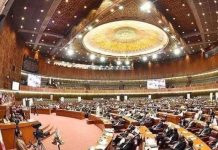DNA
ISLAMABAD: India and Pakistan may both be disinterested in speaking to one another, but South Asia needs its perennial challenges to be resolved, including the Kashmir issue.
Pakistan needs to renew its commitment to creating options on Kashmir and overturn India’s strategy of containment, stated Senator Sherry Rehman at Jinnah Institute’s policy roundtable discussion titled, ‘Stocktaking Prospects for Stability in South Asia’ on Wednesday, 26th August, 2020. Prominent foreign policy experts and existing and former government functionaries gathered a local hotel to discuss the future of Kashmir a year after India imposed a lockdown on August 5th.
Participants at the roundtable debated the merits of Pakistan’s global narrative on Kashmir. They questioned the official approach towards resolving the Kashmir issue. While agreeing that the issue had been internationalized to a great extent, through discussions in legislatures abroad, and advertisement campaigns in western capitals, Pakistan had a limited number of options from the diplomatic toolkit. They discussed that the foreign office needs to innovate its traditional foreign policy approach, and revise its methodologies that enable greater projection of Pakistan’s interests and qualitative improvement of relations. They also discussed that Pakistan needed effective economic diplomacy based on institutional reform and capacity to deliver. The persistent differential in economic growth rates of India and Pakistan for the last 20-30 years had led to such large differentials in policy vision, outlook and credibility.
Participants stated that Prime Minister Modi was driving majoritarian Hindutva policies at home and abroad, that impeded good relations with India’s neighbours. Nepal and Bangladesh had revised their diplomatic ties with India soon after the conflagration on the Indo-China border. They also agreed that the international community was unwilling to take preventive action on Kashmir, as India projected economic power and profitable markets, as evidenced by companies like Google setting up investment funds there. They stated that international human rights committees undertook token discussions about Kashmir which had no subsequent bearing on policy.
As far as the US was concerned, Pakistan would have to wait and see the outcome of the 2020 Presidential Elections. A victory for presidential candidate Joe Biden could potentially open up the avenue to engage India in the future, as his running mate, Kamala Harris; her large support base in the Indian diaspora could help normalize relations back in South Asia, and especially if she were to win the election.
The policy discussion was part of Jinnah Institute’s long term Track 2 efforts that seek to enable stability in South Asia, and create space for articulating Pakistan’s foreign policy imperatives. DNA
===========











